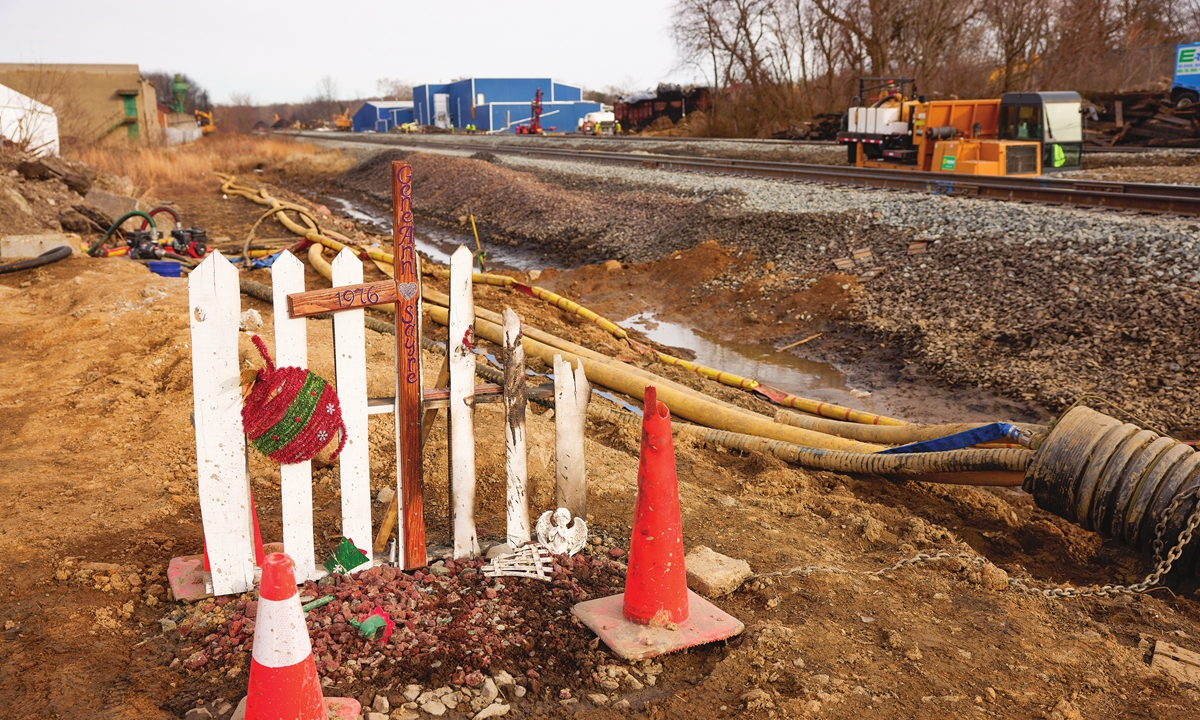
A damaged memorial stands near the railroad tracks on February 14, 2023 in East Palestine, Ohio. A train operated by Norfolk Southern derailed on February 3, releasing toxic fumes and forcing evacuation of residents. Photo:VCG
Angry local residents from the Ohio town where a train derailed and spilled toxic chemicals packed into a high school gym on Wednesday, seeking answers to what health dangers they face, Reuters reported.
Officials in Ohio admitted Tuesday that toxic chemicals released last week after about 50 cars derailed in a fiery crash have contaminated local water, soil and air, according to media reports. The update on environmental safety in local community that already came later than expected clearly did not answer local residents' increasingly concerns about the accident's spillover impacts on their health and life.
This serious train derailment and hazardous chemical leakage incident occurred on the evening of February 3 local time. In the nearly past two weeks, the reactions and response of US environmental protection and transportation departments and local officials were seen as slow or even indifferent in some cases. The attempt by some US politicians to downplay the incident has aroused dissatisfaction in public opinion. Anxiety and distrust are running deep among local residents, The New York Times reported on Wednesday.
US Secretary of Transportation Pete Buttigieg spoke for the first time for the severe accident on social media Twitter on Tuesday that the US government will "use all relevant authorities to ensure accountability and continue to support safety." However, the response made ten days after the accident obviously failed to satisfy the netizens and local residents.
Indeed, the US government should conduct an in-depth investigation into the cause of the derailment, and it is even more important to follow the potential risks to the local environment and the impact on residents' health. In fact, the ecological disaster that could lead to serious health crisis and the officials' attempt to downplay it once again exposed the profound problem of the US government's ineffective economic and social governance.
Although Norfolk Southern Corp, the company behind the Ohio chemical spill, is facing scrutiny from regulators, public officials and residents, US media outlets exposed that, before the accident, the company had fought against a new US Department of Transportation safety rule that may have helped limit the impact of this month's derailment.
The proposal of related federal safety rule for rail industry started a decade ago. In face of a major uptick in rail derailments carrying crude oil and hazardous chemicals at the time, including a New Jersey train crash that leaked the same toxic chemical as in Ohio, the Obama administration in 2014 proposed improving safety regulations for trains carrying petroleum and other hazardous materials.
However, after industry pressure, the final measure ended up narrowly focused on the transport of crude oil and exempting trains carrying many other combustible materials, including the chemical involved in the latest disaster in Ohio, according to media reports.
Ten years later, the US has experienced three governments, and the safety regulations that were supposed to prevent the Ohio derailment still cannot be enforced. The inefficiency of the US government's economic and social governance is one of the main reasons behind the leakage of hazardous chemicals in Ohio.
The inefficiency of the US government in economic and social governance has clearly become a chronic affliction. As the Guardian pointed out in its report on the incident, the Ohio catastrophe is a "wake-up call" to dangers of deadly train derailments. More importantly, it should serve as a wake-up call for the US to improve governance efficiency. If the problems that hold back the pass of the rail safety rules in the past decade are not solved, as the USA Today reported on Tuesday, the Ohio derailment disaster could happen more often.
Whether the US government is able to properly address local residents' concerns and secure their safety is a test of its governance capacity. It is hoped that the accident will not be used in the battle for political influence. For the safety and interests of the American people, and for the development of the US economy and society, US politicians should adopt a more responsible attitude to properly deal with the current problems and have courage to cure the chronic affliction of inefficiency.
The author is a reporter with the Global Times. bizopinion@globaltimes.com.cn




